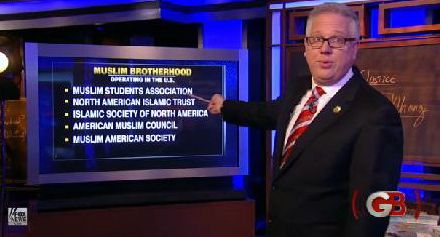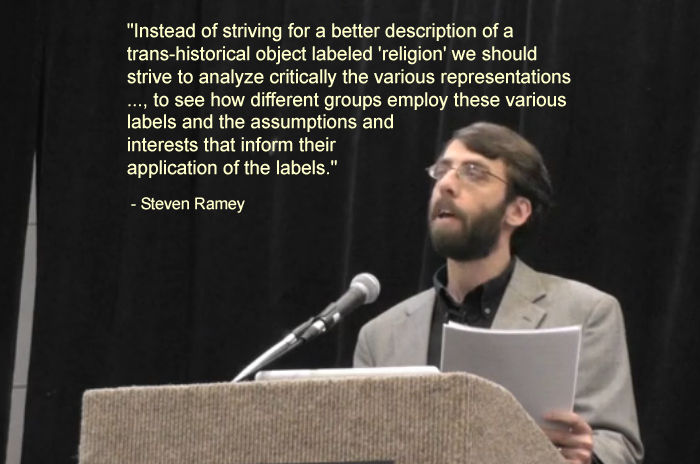 The recent round of criticism of FOX News’s online interview of Reza Aslan has got me thinking a little more about this charge of Islamophobia that you often hear leveled by those on the political left — as in those who criticized any analysis of this episode that failed to out the FOX network (or other media personalities) as stirring the embers of hatred among some segments of the U.S. population of Muslims, either at home or abroad. While the bizarre questions posed to Aslan about not disclosing an identity that he in fact routinely discusses in the media — insinuating, it would seem, that some worldwide conspiracy would finally be evident if the American public knew that a Muslim author had written a book on Jesus?! — or the breath-taking conspiracy theories of some commentators on the political right (such as Glenn Beck, in action above) are quite troubling to me in a number of ways, I’m not so sure about this label of Islamophobia. For, in my reading, the effort to create the impression of safe versus dangerous religions and the energy invested in distinguishing the orthodox whom some “we” gladly accept from radicals whom that same “we” can safely marginalize, is part of the stock and trade of many scholars of religion and political commentators whom many of us would never dream of accusing of being Islamophobes. Simply put, all across the political spectrum, at least in Europe and North America, we seem to find people in the media working to identify the portion of Islam that, in their opinion, we should be afraid of — it just happens that they all identify different portions.
The recent round of criticism of FOX News’s online interview of Reza Aslan has got me thinking a little more about this charge of Islamophobia that you often hear leveled by those on the political left — as in those who criticized any analysis of this episode that failed to out the FOX network (or other media personalities) as stirring the embers of hatred among some segments of the U.S. population of Muslims, either at home or abroad. While the bizarre questions posed to Aslan about not disclosing an identity that he in fact routinely discusses in the media — insinuating, it would seem, that some worldwide conspiracy would finally be evident if the American public knew that a Muslim author had written a book on Jesus?! — or the breath-taking conspiracy theories of some commentators on the political right (such as Glenn Beck, in action above) are quite troubling to me in a number of ways, I’m not so sure about this label of Islamophobia. For, in my reading, the effort to create the impression of safe versus dangerous religions and the energy invested in distinguishing the orthodox whom some “we” gladly accept from radicals whom that same “we” can safely marginalize, is part of the stock and trade of many scholars of religion and political commentators whom many of us would never dream of accusing of being Islamophobes. Simply put, all across the political spectrum, at least in Europe and North America, we seem to find people in the media working to identify the portion of Islam that, in their opinion, we should be afraid of — it just happens that they all identify different portions.
For example, steering clear for the moment of the more easily spotted (and critiqued) caricatures that we find in the televised mass media or on a variety of websites, many of the standard scholarly introductions to the study of Islam (let alone books on almost any other social group known as a religion, by the way) presuppose a virtually timeless, normative essence that can be found manifested in only certain versions of contemporary Islam, making evident that while some are pure other forms are polluted and their members prone to misinterpreting and misapplying, or even abusing, the original message. (If you recognize this preoccupation with origins as a familiar tune sung also by scholars 100 years ago, such as William James, then you’ll get an idea of how far some parts of our field have progressed.) For example, as I once documented (see p. 47), consider these two standard intro books’ descriptions:
If the principles of Islam were followed, every Muslim would treat every other Muslim like a brother; in fact, they have been attacking one another almost since the founding of the faith. (Thomas Lippman, Understanding Islam: An Introduction to the Muslim World, 1995: ix)
Muslims true to their calling should continue to invite others to the Straight Path and to hope for a day when all humans will celebrate their brotherhood and sisterhood in a worldwide Umma, reflecting God’s Unity in human religious unity and harmony. (Frederick Denny, Islam and the Muslim Community, 1987: 127).
Spot the normative statements dressed up like the idle descriptions of a well-meaning, objective anthropologist doing fieldwork?
Should one happen to have affinity for what, in much scholarship, gets quickly labeled by experts as innocuous but non-dominant, marginal, heterodox, or maybe even radical variations and imitations — that is, those intertwined systems of belief and practice that are no doubt Islam to the many people across the globe who identify with them but which don’t fit the experts’ narratives — then such scholarly claims about the timeless principles of Islam and its true (as opposed to false, presumably) calling will more than likely strike you as unfair, inaccurate, serving a particular social, political, or theological purpose of importance to the author, and thus perhaps even as, dare I say, Islamophobic judgments unfairly targeting what someone else may happen to see as the only truly proper or original form of the faith, no? If we were to sit beside such practitioners while they watched the talking heads who routinely appear on television or in print media to make pronouncements on the authenticity of this or that form of Islam, I have no doubt that we’d quickly hear characterizations of these so-called mainline scholarly opinions that would deviate rather significantly from how the rest of us normally hear these experts.
My point? Despite the widely influential notion of a  Aslan himself provides a nice example of not making the shift that Ramey advocates, doing so in the Prologue of his first book, also widely selling. “After all,” he writes, “religion is, by definition, interpretation; and by definition, all interpretations are valid,” getting himself into quite a mess if he wishes to then argue for a particular path that the future of Islam ought to point toward (i.e., the hardly novel position concerning the need for a so-called Islamic Reformation compatible with liberal democratic values). He tries to get out of it in the very next sentence, of course: “However, some interpretations are more reasonable than others.” All valid, though some are unreasonable? A quick mention of Maimonides (d. 1204) presumably does the trick to support the point. Or maybe not.
Aslan himself provides a nice example of not making the shift that Ramey advocates, doing so in the Prologue of his first book, also widely selling. “After all,” he writes, “religion is, by definition, interpretation; and by definition, all interpretations are valid,” getting himself into quite a mess if he wishes to then argue for a particular path that the future of Islam ought to point toward (i.e., the hardly novel position concerning the need for a so-called Islamic Reformation compatible with liberal democratic values). He tries to get out of it in the very next sentence, of course: “However, some interpretations are more reasonable than others.” All valid, though some are unreasonable? A quick mention of Maimonides (d. 1204) presumably does the trick to support the point. Or maybe not.
Because of flimsy arguments like this, scholars whose work presupposes a normative, orthodox, or natural form of any religion, as if it were a descriptive self-evidency and the timeless standard against which all other forms were measured, ought to cause us to stop and dig a little deeper. Thus, the term “Islamaphobia,” much like the term “cult” as it is used on magazine covers to shock readers, strikes me as nothing but a rhetorical term and hardly a category of any scholarly or analytic value. It’s a way of shaping public opinion by theatrically calling out others’ assumptions and social interests while simultaneously cloaking ones own — for I’d hazard a guess that almost anyone using the term will, in the next breath and without seeing any irony, distinguish true Islam from its “misguided appropriations,” trying very hard to ensure that the latter are not even classified as Islam. So while useful for rallying the troops on your side, all of whom are no doubt keen to reproduce a very particular view of the world, it is a term that tells us nothing of interest about the supposed object of study.
What if, instead, we acknowledged from the outset that in order to put together a coherent sentence about the world we need to simplify and generalize, and that simplification and generalization are always in the service of a set of interests and thus working toward practical, persuasive goals? Then how would we approach not only talking about Islam ourselves, let alone any other social movement, but — more importantly, perhaps — how would we then listen to others (all others) talk about it as if it were a uniform, coherent thing in the world that endures over time? Listening with those critical ears will be a challenge, but one worth accepting, I think; for failing to make this switch means failing to take others seriously as being just as persuaded by the things with which “they” agree as are “we.”
